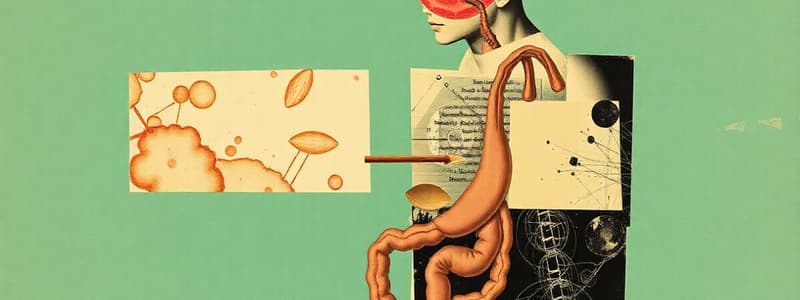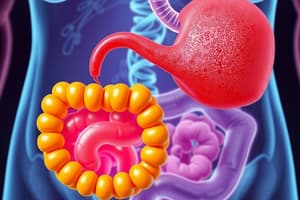Podcast
Questions and Answers
What is the primary function of the human digestive system?
What is the primary function of the human digestive system?
- To excrete waste products from the body
- To process organic molecules for cellular absorption (correct)
- To provide nutrients directly to the bloodstream
- To synthesize vitamins and minerals
Which enzyme is produced in the stomach, according to the content?
Which enzyme is produced in the stomach, according to the content?
- Pepsin (correct)
- Amylase
- Trypsin
- Lipase
What characterizes facilitated diffusion?
What characterizes facilitated diffusion?
- It occurs only in the small intestine
- It moves substances against the concentration gradient
- It is a passive movement of molecules along a concentration gradient (correct)
- It requires energy in the form of ATP
What is the end product of glycolysis?
What is the end product of glycolysis?
What defines monosaccharide malabsorption?
What defines monosaccharide malabsorption?
What does the proximal part of the jejunum primarily absorb?
What does the proximal part of the jejunum primarily absorb?
What is the normal value range of a2 globulins in blood?
What is the normal value range of a2 globulins in blood?
Chyluria is characterized by what symptom?
Chyluria is characterized by what symptom?
Flashcards
Absorption
Absorption
The process by which digested nutrients pass from the digestive tract into the bloodstream.
Glycolysis
Glycolysis
The breakdown of glucose to produce energy in the form of ATP.
Pepsin
Pepsin
The enzyme that breaks down proteins in the stomach.
Pancreatic Lipase
Pancreatic Lipase
Signup and view all the flashcards
Diffusion
Diffusion
Signup and view all the flashcards
Facilitated Diffusion
Facilitated Diffusion
Signup and view all the flashcards
Disacchariduria
Disacchariduria
Signup and view all the flashcards
Circulation
Circulation
Signup and view all the flashcards
Study Notes
Digestion and Absorption
- Products of digestion enter cells via absorption.
- Glucose movement from digestive tract to muscle cells relies on absorption and circulation.
- The digestive system processes organic molecules for cellular use.
Digestive Enzymes
- Pepsin is produced in stomach cells, trypsin in small intestine cells.
- Different enzymes are due to differing gene expression.
Carbohydrate Intake
- Adults consume 150-300 grams of carbohydrates daily.
Cellular Energy Production
- Mitochondria convert food energy to ATP.
Lipid Digestion and Absorption
- Jejunum (proximal portion) is the primary site for lipid product absorption.
Absorption Mechanisms
- Facilitated diffusion: Passive movement along a concentration gradient, selective.
- Diffusion: Movement from high to low concentration.
- Passive diffusion: Simple, unregulated membrane crossing.
Glycolysis
- Glucose breakdown to produce energy (ATP, pyruvate, NADH, water).
Receptor and Disease
- Nicotinic-acetylcholine receptor (receptor type).
Disacchariduria and Monosaccharide Malabsorption
-
Disacchariduria: Large disaccharide excretion in urine
-
Monosaccharide malabsorption: Inherited condition with slow glucose/galactose absorption due to carrier defects.
Sucrase-Isomaltase Deficiency
- Inherited deficiency of sucrase and isomaltase enzymes, occurring in early childhood.
Lipid Intake
- Adults consume 50-150 grams of lipids daily.
Blood Protein Levels
- Normal a2-globulin level: 0.6-1 g/dL
- Normal total protein level: 60-83 g/L
- Normal blood ketone bodies level: 1 mg/100 ml
Small Intestine and Lipid Digestion
- Small intestine is the major site for lipid digestion via pancreatic lipase.
- Pancreatic lipase requires colipase and bile salts for activity.
Chyluria
- Milky urine due to abnormal connection between urinary tract and intestinal lymphatics.
Cholesterol Synthesis
- 1 gram of cholesterol is synthesized daily.
Protein Intake
- Adults consume 70-100 grams of protein daily.
Glucose Use by Brain
- The brain consumes 100 grams of glucose daily.
Hartnup Disease
- Inherited condition impacting aromatic/hydrophobic amino acid absorption in the intestine and kidney, leading to excretion in urine due to carrier defects.
Studying That Suits You
Use AI to generate personalized quizzes and flashcards to suit your learning preferences.




